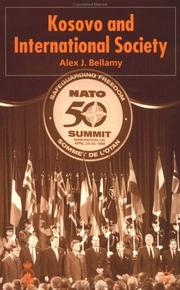| Listing 1 - 10 of 1034 | << page >> |
Sort by
|
Book
ISBN: 9789004480940 9789041114396 Year: 2000 Publisher: Leiden; Boston : Brill | Nijhoff
Abstract | Keywords | Export | Availability | Bookmark
 Loading...
Loading...Choose an application
- Reference Manager
- EndNote
- RefWorks (Direct export to RefWorks)
Book
ISBN: 9783657791866 Year: 2023 Publisher: New York : BRILL,
Abstract | Keywords | Export | Availability | Bookmark
 Loading...
Loading...Choose an application
- Reference Manager
- EndNote
- RefWorks (Direct export to RefWorks)
Die Edition präsentiert erstmals wesentliche Dokumente zur sowjetischen Politik vor dem Zweiten Weltkrieg in deutscher Übersetzung.Hitler wollte den Krieg. Die anderen Mächte in Europa - Großbritannien, Frankreich und die UdSSR - versuchten sich an verschiedenen Strategien, um einen deutschen Angriff auf das eigene Land und andere zu verhindern oder zumindest zu verzögern. Eine entsprechende Zusammenarbeit zwischen Paris, London und Moskau erwies sich als äußerst schwierig. Die Rolle der sowjetischen Politik, aber auch die der anderen beteiligten Staaten in diesen Konstellationen ist umstritten. Erstmals werden hier zentrale Dokumente zur sowjetischen Politik in dem entscheidenden Zeitraum vom "Anschluss" Österreichs im März 1938 bis zum Hitler-Stalin-Pakt im August 1939 in deutscher Übersetzung veröffentlicht.
Book
ISBN: 1135225052 1315036908 1135224986 9781135225056 9781135224981 1135225125 9781135225124 Year: 2014 Publisher: London
Abstract | Keywords | Export | Availability | Bookmark
 Loading...
Loading...Choose an application
- Reference Manager
- EndNote
- RefWorks (Direct export to RefWorks)
Recently declassified documents and new scholarship have prompted this reassessment of the collusion between Israel, France and England which drove the 1956 War. International aspects, Israeli involvement, the plot which sparked off hostilities, and the Egyptian losses and gains are analyzed.
Book
Year: 1894 Publisher: Bruxelles Librairie européenne C. Muquardt, Th. Falk, éditeur
Abstract | Keywords | Export | Availability | Bookmark
 Loading...
Loading...Choose an application
- Reference Manager
- EndNote
- RefWorks (Direct export to RefWorks)
Diplomatic history --- Diplomacy --- Nederland --- Belgium
Book
Year: 1946 Publisher: Lisboa Imprensa Nacional
Abstract | Keywords | Export | Availability | Bookmark
 Loading...
Loading...Choose an application
- Reference Manager
- EndNote
- RefWorks (Direct export to RefWorks)
Compilação de vários documentos diplomáticos relativos à aliança entre Portugal e Inglaterra.
Portugal --- England --- Alliances --- Diplomatic history

ISBN: 0333965035 Year: 2002 Publisher: Houndmills Palgrave
Abstract | Keywords | Export | Availability | Bookmark
 Loading...
Loading...Choose an application
- Reference Manager
- EndNote
- RefWorks (Direct export to RefWorks)

ISBN: 0333992601 Year: 2002 Publisher: Houndmills Palgrave Macmillan
Abstract | Keywords | Export | Availability | Bookmark
 Loading...
Loading...Choose an application
- Reference Manager
- EndNote
- RefWorks (Direct export to RefWorks)
Book
Year: 1957 Publisher: Princeton, NJ : Princeton University Press,
Abstract | Keywords | Export | Availability | Bookmark
 Loading...
Loading...Choose an application
- Reference Manager
- EndNote
- RefWorks (Direct export to RefWorks)
Book
ISBN: 0674061179 9780674061170 9780674049543 0674049543 9780674725935 067472593X Year: 2011 Publisher: Cambridge, MA
Abstract | Keywords | Export | Availability | Bookmark
 Loading...
Loading...Choose an application
- Reference Manager
- EndNote
- RefWorks (Direct export to RefWorks)
The common explanation for the outbreak of World War I depicts Europe as a minefield of nationalism, needing only the slightest pressure to set off an explosion of passion that would rip the continent apart. But in a crucial reexamination of the outbreak of violence, Michael Neiberg shows that ordinary Europeans, unlike their political and military leaders, neither wanted nor expected war during the fateful summer of 1914. By training his eye on the ways that people outside the halls of power reacted to the rapid onset and escalation of the fighting, Neiberg dispels the notion that Europeans were rabid nationalists intent on mass slaughter. He reveals instead a complex set of allegiances that cut across national boundaries.Neiberg marshals letters, diaries, and memoirs of ordinary citizens across Europe to show that the onset of war was experienced as a sudden, unexpected event. As they watched a minor diplomatic crisis erupt into a continental bloodbath, they expressed shock, revulsion, and fear. But when bargains between belligerent governments began to crumble under the weight of conflict, public disillusionment soon followed. Yet it was only after the fighting acquired its own horrible momentum that national hatreds emerged under the pressure of mutually escalating threats, wartime atrocities, and intense government propaganda. Dance of the Furies gives voice to a generation who found themselves compelled to participate in a ghastly, protracted orgy of violence they never imagined would come to pass.
Book
Year: 1917 Publisher: Paris : Van Oest,
Abstract | Keywords | Export | Availability | Bookmark
 Loading...
Loading...Choose an application
- Reference Manager
- EndNote
- RefWorks (Direct export to RefWorks)
| Listing 1 - 10 of 1034 | << page >> |
Sort by
|

 Search
Search Feedback
Feedback About UniCat
About UniCat  Help
Help News
News